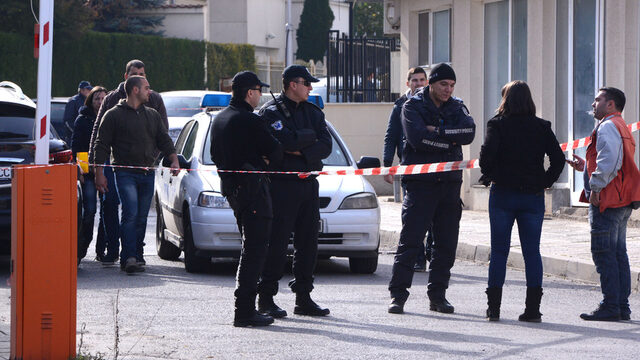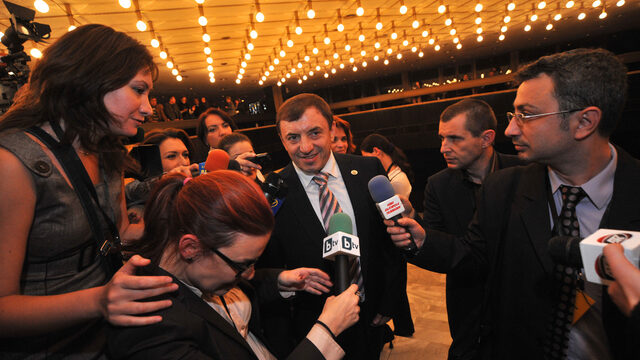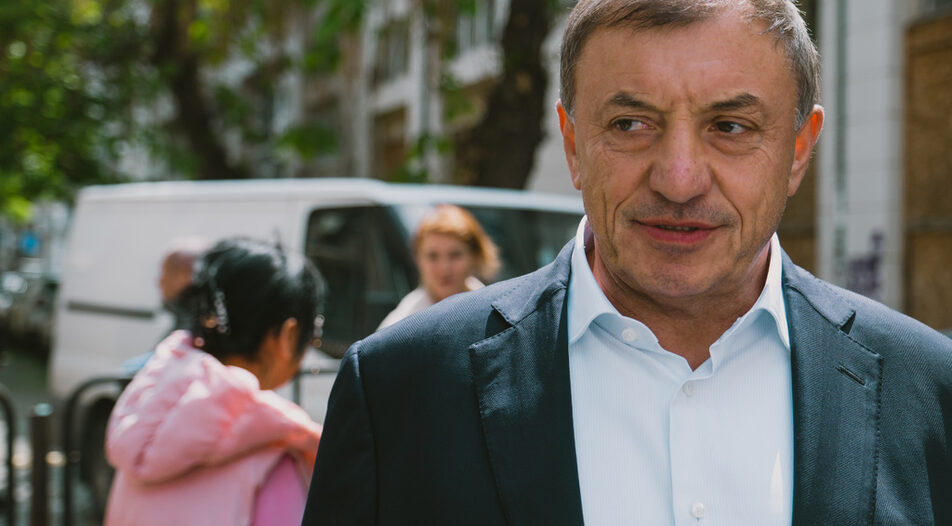Alexey Petrov, a businessman and a prominent figure in Bulgaria's post-communist transition, was shot dead while walking up Vitosha mountain just outside Sofia on Wednesday. According to initial information, the killing took place around noon and, in addition to Mr Petrov, a female companion was wounded and is currently in a critical condition in Pirogov emergency hospital. Insiders claimed this was Mr Petrov's usual route on a mountain hike.
The killing comes after two failed assassination attempts n August 2002 and October 2015. In 2002, he got shot twice - but survived, while the last attack against him seven years ago saw Mr Petrov's car fired at with a grenade launcher. Only the armor of the former special police operative's Mercedes saved him. The perpetrator, Roman Logvinenko, was arrested and convicted in 2021, but released from prison in May this year.
A man who personified the 1990s
Alexey Petrov's business history began in the 1990s, in the "Wild East" years of Bulgarian insurance, when it was dominated by groups like the SIC and VIS-2. He was then a partner in one of the early power insurers Apollo and Bolkan, with other famous ex-officers Rumen Nikolov-Pashata and Zlatomir Ivanov-Baretata. And at a slightly later stage, when the partners in the collapsing Apollo and Bolkan divided his market share, he founded a new company, Spartak, together with several sports clubs, security companies and his colleagues from the Union of Former Berets. Today this company, after a series of transformations, is called Lev Ins and is the leader in premium income on the Bulgarian insurance market.
Mr Petrov had many faces: a former employee and undercover agent of the communist-era counterintelligence, ex-beret of the Specialized Unit for Combating Terrorism, a lecturer in "Corporate Security" at the UNWE, founder of the Cyber Security Department at Plovdiv University, publisher of the newspaper "Gallery" and adviser to the National Security Agency (DANS). He largely embodied the typical image of the power players who took over the scene in the 1990s and gradually became key figures in business and politics.
Who was "the Tractor?"
Petrov absolutely fits the definition of a "man with a past". He graduated from the police academy in Pazardzhik, where he acquired the nickname "the Tractor" because of his ambitious character. Then, as a member of the Specialized Unit for Combating Terrorism, known during socialism as the "Red Berets", he participated in the neutralization of a dangerous terrorist at Sofia's Central Station.
After leaving the state apparatus in the early 1990s, he registered a security company called Apollo and later an insurance company Apollo and Bolkan, which in the following year included other well-known people from the 1990s underworld, Zlatomir Ivanov "the Beret", Plamen Ivanov-Kimbata and Rumen Nikolov-Pashata. "The Beret" was publicly shot while being taken to court in 2013, while Kimbara was killed in front of his home in 1995. It was Petrov who consolidated the society of former berets into an association and another security firm, In-80. Initially their headquarters was in the former Ajax Hotel, hence the name of the informal group, but they later moved to the Spartak pool in the capital.
At the end of 1996, the company began to collapse and Mr Petrov attracted an Israeli investor, with whom he obtained a license to create the Spartak insurance company. A key point in his biography from this period is his friendship with military prosecutors, most notably Nikolai Kolev, who was shot in 2002. Kolev's widow then accused Mr Petrov of being an accomplice in this murder. At the same time, Petrov became close to former Prosecutor General Nikola Filchev, who has been accused of ordering the killing.

Petrov's transformation into a "white collar"
After the turbulent years of the 1990s, Petrov underwent a metamorphosis typical of many similar faces of the transition in Eastern Europe. He began to gradually lighten his business, as well as enter into official relations with state institutions. At that time, the precursor to DANS - the National Security Service, headed then by Democratic Bulgaria's Atanas Atanasov, recruited Alexey Petrov as an assistant of the service.
Mr Petrov apparently did indeed work with the services, with sources claiming at the time that there was even an option for him to head the service for fighting organized crime. In 2002, however, he was attacked in front of Spartak, probably by the group of another beret, Bai Dobri. This prevented Petrov from entering the state structure.
He was the organizer of a notorious 2008 meeting between then Interior Minister Rumen Petkov and former Beret and racketeering defendants Plamen Galev and Angel Hristov from Dupnitsa. Shortly afterwards, Mr Petrov was officially appointed advisor to Petko Sertov in the newly formed DANS and became perhaps the most influential figure there.
Operation "Octopus"
After this period of rapprochement with the state, the coming to power of Boyko Borissov (with whom Mr Petrov had a short-lived company in the 1990s) and GERB marked a new period of relations with Mr Petrov. He has repeatedly stressed that he and the GERB leader have a common past and very similar fates, and Mr Borissov has spoken of him in flattering terms on several occasions. In 2010, however, the state frontally attacked Mr Petrov. The Interior Ministry, led by Tsvetan Tsvetanov, launched a police operation with the telling name "Octopus", which led to the arrest of Petrov and people the police claimed were close to him.
All of them were indicted for participation (and Petrov - for leadership) in an organized criminal group established to commit a whole spectrum of crimes - racketeering, money laundering, tax crimes, solicitation of prostitution.. A little later Petrov also became accused of disclosing classified information. From the very first hearings on the group's pre-trial detention measures, it emerged that there was a lot of evidence in the case for the thesis that Alexey Petrov was engaged in racketeering. Like many other operations of the time, however, this one also fell apart in court.

The rise of the Lev Ins business empire
Petrov's biggest company was undoubtedly Lev Ins, although for years he had no direct stake in it. At the end of the previous parliament, the texts, which were supposed to ensure compliance with the rules in the international Green Card system, were not adopted under strong opposition from people and organizations close to Lev Ins, but this July, largely surprisingly, the obstruction abruptly disappeared and the changes passed almost without debate. At the heart of the whole problem that led to the Bulgarian Green Card Bureau being placed under monitoring was precisely Lev Ins' refusal to pay claims made by its clients abroad, claiming that it was the victim of fraud.
Petrov's last act
In one of his last public appearances in June this year, Petrov told bTV that he would return to DANS if economic security was given the "necessary importance". He clarified that he had not received any offers for public posts and then added that if he received an invitation, he would accept a post in the services.
Amid increased rumors at the time that he had helped form the government between WCC-DB and GERB, Mr Petrov then commented that "his role was over-egged". Mr Petrov commented that he knew Borissov and Kiril Petkov's father, Petko Petkov, due to their common interest - martial arts, and it was normal for them to talk about the current topic of forming a government.
Petrov's killing is notable, as it is the third death of a high-profile 1990s mafia figure this year - in May Angel Hristov, known as one of the "Galev brothers" was found dead in his home in Samokov, Bulgaria, after being considered exiled for more than a decade; and Krassimir Kamenov - Karo, considered as one of the heads of the drug trafficking rings in Bulgaria during the 1990s, was killed in South Africa the same month.
Alexey Petrov, a businessman and a prominent figure in Bulgaria's post-communist transition, was shot dead while walking up Vitosha mountain just outside Sofia on Wednesday. According to initial information, the killing took place around noon and, in addition to Mr Petrov, a female companion was wounded and is currently in a critical condition in Pirogov emergency hospital. Insiders claimed this was Mr Petrov's usual route on a mountain hike.
The killing comes after two failed assassination attempts n August 2002 and October 2015. In 2002, he got shot twice - but survived, while the last attack against him seven years ago saw Mr Petrov's car fired at with a grenade launcher. Only the armor of the former special police operative's Mercedes saved him. The perpetrator, Roman Logvinenko, was arrested and convicted in 2021, but released from prison in May this year.












